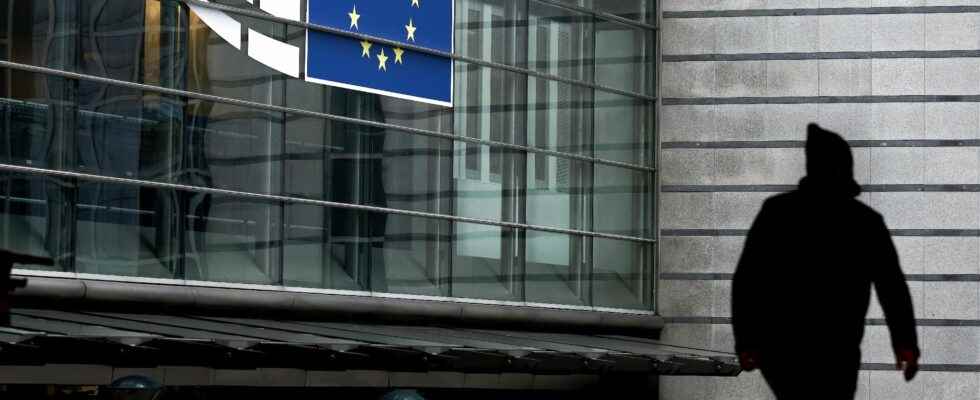“Hello to the European Parliament!” Says Victor Orban, all perky. In the aftermath of “Qatargate”, a vast affair of corruption which shakes the institution up to its governing bodies, the Hungarian Prime Minister has the mocking tweet. And for good reason: while Europe has been putting pressure on it for months to strengthen its laws against corruption, MEPs are arrested in the middle of Brussels, with suitcases overflowing with cash.
Before imposing anti-corruption laws on Hungary, should Europe first take care of its own parliament? Orban provokes, but hits the mark. Since the discovery of one million euros in cash at several MEPs this Friday and the arrest of Eva Kaili, the vice-president of the Parliament, a well-known refrain begins to be heard again in Brussels. “We will have to urgently strengthen our institution to fight against the poison of corruption”, thus estimated the French MEP Aurore Lalucq, member of the Socialists and Democrats group (S & D, left).
Judge Michel Claise, at the origin of this investigation, directly incriminates Qatar and Morocco, two countries in search of influence on the Old Continent: “We are living in a period when the economy is completely penetrated by dirty money. […] Europe is extremely weak in this respect”, considers the Belgian magistrate, questioned by France Info, this Monday. The European Parliament would be a sieve.
“Without rules, it’s easy to monetize your influence”
After the first revelations and despite the denials of Eva Kaili and Qatar, deemed at this stage not very credible, the President of Parliament Roberta Metsola immediately promised a new reform of the rules governing the deputies, thus implying that a stricter follow-up of the activities of Members could perhaps have avoided the scandal, or mitigated its extent.
“Nothing will ever prevent a deputy from allowing himself to be corrupted, but without precise and strict rules, it is easy to monetize his influence”, agrees Olivier Costa, research director at the CNRS, specialist in these questions. Parliament is regularly singled out for finger for a form of laxity towards the various forms of influence, legal, or not. “To say that the Kaili affair is typical of what is happening in Brussels seems exaggerated, the seizures are incredible, but there is a context favorable to corruption, despite previous efforts and reforms”, adds the researcher.
Qatargate is not a first. In 2011, journalists from the Sunday Times dressed up as lobbyists have offered tens of thousands of euros to MEPs. “Their first defense was to say that they were not doing anything illegal, since it is allowed to carry out consulting activities during the mandate”, underlines Olivier Costa. The argument was not accepted, the main suspect, Ernst Strasser, MEP and former Minister of the Interior in Austria, was sentenced to 4 years in prison, but the case had the merit of recalling the importance to lay down rules.
Since then, the European institutions have equipped themselves with a transparency register, an optional form which notably collects the money spent by interest groups. In exchange, lobbyists can wander the corridors of Parliament “without invitation”. 12,000 entities are listed there. Are the Qatari officials who allegedly approached Eva Kaili listed? “The emissaries of third countries are not considered as lobbyists, but when the representatives of Qatar come to Parliament, it is not to talk about the sunsets in Doha, but rather about their interests”, regrets Olivier Costa.
Self-monitoring… and extremely rare sanctions
The transparency register marks the European approach to influence: tracking, rather than prohibiting. Empower rather than control. In theory, MPs are not allowed to accept payments or rewards in exchange for political work. And the gifts they receive from foreign countries must be recorded, according to a “Code of conduct”, enacted in 2012. But, in practice, it is the parliamentarians themselves who declare and control themselves, in the form of a committee. And the penalties are extremely rare.
A functioning regularly denounced by Transparency International. The NGO, spearhead of the international fight against corruption, sees in the Kaili affair the result of carelessness. “For several decades, Parliament has allowed a culture of impunity to develop, combining lax financial rules and controls with a total absence of independent ethical oversight. In many ways, this culture of impunity has become law in self”, asserted the organization, in a press release, published in the wake of the arrests of this weekend.
The NGO, like Olivier Costa, recommends the creation of an independent authority, responsible for setting up surveillance and sanctions. And tougher rules. It is still necessary to agree on what a deputy can or cannot accept, and on the vision to adopt. “Some countries want absolute transparency, others think that lobbying should be liberalized, while some are against the control of influence, for fear of a form of legitimization of this practice, which they refuse” , summarizes Olivier Costa, author of a study on the subject. In terms of influence too, Europe is still looking for common standards.
